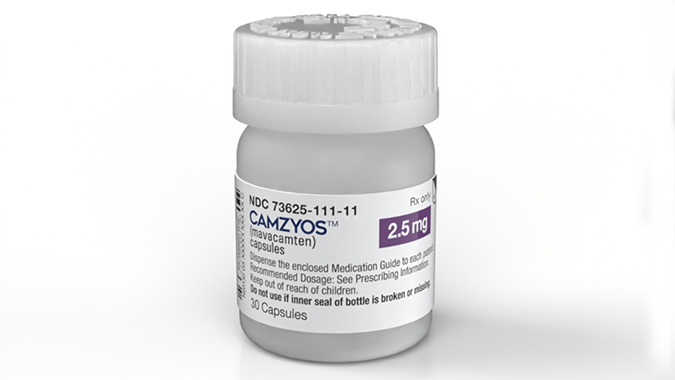The U.S. Food & Drug Administration has granted approval to Bristol Meyers Squibb’s drug Camzyos to improve cardiac function in adults with a heart condition called symptomatic obstructive hypertrophic cardiomyopathy, or obstructive HCM.
Obstructive HCM occurs when the heart muscle thickens, mostly in the septum (the heart wall that separates its right and left sides) and obstructs blood flow from the heart to the rest of the body. The severity of the condition varies, but it can cause serious symptoms, such as heart palpitations, shortness of breath, leg swelling, decreased exercise capacity, and even death.
Camzyos (mavacamten) is the first and only FDA-approved cardiac myosin inhibitor that specifically targets the source of obstructive HCM. The FDA approval, which was announced April 29, is based on findings from Phase III EXPLORER-HCM clinical trial that enrolled 251 adults with obstructive HCM.
“This is a first-in-class medicine specifically for patients living with symptomatic obstructive HCM,” said Milind Desai, M.D., MBA, director of the Hypertrophic Cardiomyopathy Center and director of clinical operations in Cleveland Clinic’s Heart Vascular & Thoracic Institute.
"With this FDA approval, U.S. cardiologists now have a new pharmacological option for eligible patients that targets the underlying pathophysiology of the disease,” Desai said.
Traditionally, HCM treatment has revolved around mitigating symptoms with drugs like beta-blockers or calcium channel blockers. Camzyos selectively inhibits cardiac myosin to trigger functional and symptomatic improvements.
“This approval builds on decades of cardiovascular leadership and reflects our steadfast commitment to people impacted by cardiovascular disease,” said Samit Hirawat, M.D., executive vice president and chief medical officer, Global Drug Development, Bristol Myers Squibb, in a company statement.
“We are proud to bring this first-of-its kind medicine to patients, which may help to address an unmet need in the U.S. in the symptomatic NYHA class II-III obstructive HCM treatment landscape,” Hirawat said.
Patients who have a serious intercurrent illness (such as a serious infection) or arrhythmia (atrial fibrillation or other uncontrolled fast heart rhythm abnormality) are at greater risk of developing impaired heart muscle contraction and heart failure with Camzyos.
Due to the risk for heart failure, patients treated with Camzyos must be monitored with echocardiograms, an imaging test that shows how well the heart is working. Patients must also avoid certain prescription and over-the-counter medicines that interfere with the metabolism of Camzyos.
Because of the potential for developing symptomatic or life-threatening heart failure if monitoring is not followed or if Camzyos is used with medicines that impair its metabolism, Camzyos is only available through a restricted program called the Camzyos Risk Evaluation and Mitigation Strategy (REMS). Further information on the Camzyos REMS is available at www.CAMZYOSREMS.com.




